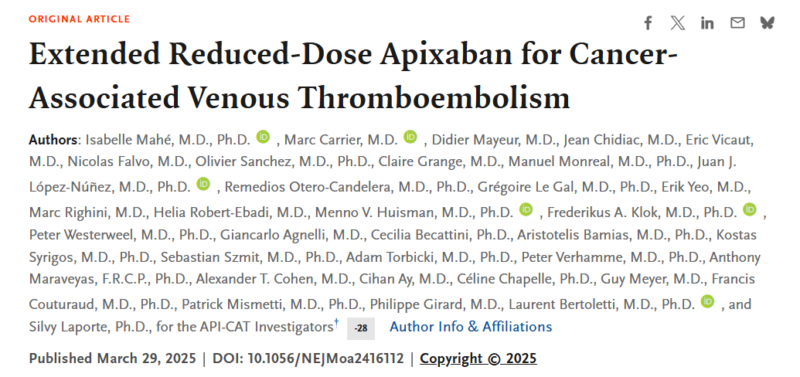Sebastian Szmit, Chair of the Council of Cardio-Oncology Study Group on Thrombosis at the European Society of Cardiology, reshared a post by ESMO on LinkedIn:
“NEJM just published the results of the API-CAT study
Everything happened during the ACC25 American College of Cardiology meeting.
Congratulations to Isabelle Mahé for the awesome leadership. I am proud to co-authored together with Prof. Adam Torbicki as the Polish Members of the Steering Committee.
Special thanks to Polish Centres. A great day for cardiooncology.”
Quoting NEJM‘s post:
“Patients with cancer-associated venous thromboembolism (VTE) are at greater risk for recurrent events despite anticoagulant therapy and for bleeding complications than patients with VTE who do not have cancer.
Anticoagulation with a direct oral anticoagulant or low-molecular weight heparin is recommended for an initial period of 6 months.
In this 60-Second Journal Club, NEJM Editorial Fellow Harleen Marwah, summarizes the API-CAT trial, which was recently presented at the American College of Cardiology Annual Scientific Session in Chicago.
The API-CAT trial found that extended anticoagulant therapy with reduced-dose apixaban was noninferior to full-dose apixaban with regard to the prevention of recurrent VTE in patients with active cancer.
Full study: Extended Reduced-Dose Apixaban for Cancer-Associated Venous Thromboembolism (API-CAT).
More video summaries from ACC25: NEJM YouTube Channel.”
Extended Reduced-Dose Apixaban for Cancer-Associated Venous Thromboembolism (API-CAT)
Authors: Isabelle Mahé et al.

Proceed to the video attached to the post.
